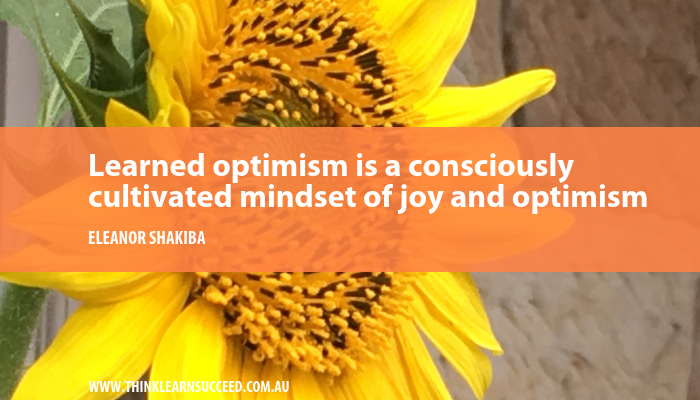 Do you see the glass as half-empty or half-full? Are you a pessimist or an optimist? It’s a classic debate. Optimism is a ‘feeling of hopefulness and confidence about the future or the success of something.’ It’s the belief that things will turn out okay, even when you have no evidence to back it up. Compared to pessimists, people who have optimistic mindsets handle change more resiliently, report higher levels of general well-being and solve problems more creatively.
Do you see the glass as half-empty or half-full? Are you a pessimist or an optimist? It’s a classic debate. Optimism is a ‘feeling of hopefulness and confidence about the future or the success of something.’ It’s the belief that things will turn out okay, even when you have no evidence to back it up. Compared to pessimists, people who have optimistic mindsets handle change more resiliently, report higher levels of general well-being and solve problems more creatively.
Here’s the good news: optimistic thinking patterns can be learned at any stage of your life. You can literally train your brain to look on the bright side as a default.
Here are four strategies that can get you started:
Keep a gratitude journal
Gratitude journals are easy to maintain. Simply set aside five minutes each day to jot down things you are grateful for over the last 24 hours. Doing this trains your brain to feel grateful for even the smallest things – a sure-fire way to challenge negative thoughts!
Take on a curiosity mindset
As a child, you probably had a pervasive sense of wonder. As an adult, you can channel this same way of looking at the world. Curiosity is also associated with intelligence and problem-solving ability – and it allows you to bring fun and novelty into situations.
Be mindful of the language you use
Consistently using negative self-talk will undermine not only your optimism, but your general well-being and confidence. Manage your self-talk by using positive or solution-oriented words to evaluate experiences.
Leave the past in the past
Many mental health professionals claim that depression evolves from dwelling on the past, while anxiety is sparked by fear of the future. Reframe negative memories by asking yourself what you learned from them. And remember that every day, you have the opportunity to create new, more positive memories.
Looking at both the downsides and upsides in any given situation is smart – it keeps you on your toes and allows you to make informed decisions. But to look at the downside as your default will make your life feel futile and hopeless. The best way to navigate through life is with a healthy balance of optimism and realistic thinking.
About the author of this article
Eleanor Shakiba specialises in teaching smart people to work with social and emotional intelligence. She is passionate about using positive psychology to support and develop talented, high performing people. She uses experiential learning and solution focused coaching techniques to do this. Find out how Eleanor can help you and your team.